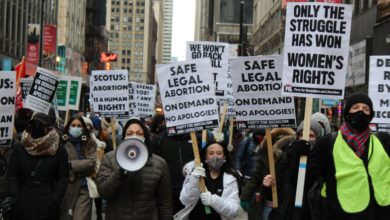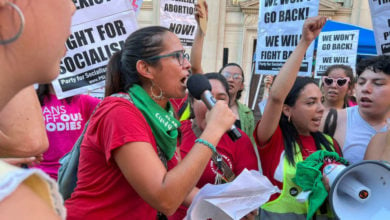Bowing to pressure from weekly actions and demonstrations, San Antonio City Council voted 9 to 2 on Aug. 2 to approve a partial version of the Guarding the Right to Abortion Care for Everyone Act. The full GRACE Act was passed by the Austin City Council July 21. That act does not legalize abortion in Austin, but effectively decriminalizes it by asking law enforcement to make prosecuting abortion seekers and providers their lowest priority.
While San Antonio’s version of the act does not contain language deprioritizing criminal investigation of abortion, it prevents city funds from being used to store, catalog or collect information for criminal investigation of abortion. It also makes reproductive rights the city’s priority in the upcoming state legislative sessions.
A response to urgent need created by right-wing cruelty
Texas’ HB 1280 “trigger law” goes into effect on Aug. 25, two months after the Supreme Court decision revoking abortion rights under the pretense of “returning” this decision to the states. The Texas trigger law, insultingly titled the “Human Life Protection Act,” criminalizes both those seeking abortions and those assisting in providing them. Doctors can face prison time or be fined up to $100,000 for providing abortion.
Ultra-right-wing state leadership is relying on a vigilante culture to enforce their new criminalization of abortion. SB 8 gives citizens the power to sue those “aiding and abetting” abortions.
This draconian layered approach by the state to oppress women and all birthing people from practicing sovereignty, bodily autonomy and health care is the reason that Councilwoman Teri Castillo drafted and introduced this a policy resolution that navigates the judicial loopholes the state has created. Councilwoman Teri Castillo represents the city’s Westside.
In San Antonio, the resolution is called Resolution of the City of San Antonio to Support Individual’s Rights to Health Care. Many progressive Texas cities, starting with Austin, are trying to protect their constituents by passing portions of the GRACE Act.
Protections are the result of sustained abortion rights campaigning
In her opening remarks, Castillo publicly thanked grassroots organizations who have been organizing for the passing of both sections of the GRACE Act for months. She stated, “The merits of adopting this resolution primarily came about because thousands of residents took to the streets week after week to support reproductive health care; and with that, I want to express my gratitude from Buckle Bunnies, Lilith Fund, Mujeres Marcharan, the PSL, DSA, AFL-CIO and Andres from University Church.”
The efforts by these and other groups did not go in vain, as many people were trained and prepared to give public comment, many for the first time. They were involved in shaping the political process using all forms of activism to ensure the people get what they want — protections from criminalization of abortion, miscarriages and other reproductive health issues.
More than 100 people signed up for public comment. Another 100 left written comments on the city’s public comment platform, as many people who this resolution represents were working and not able to participate at the time convenient for city staff. Many shared their personal stories, their outrage and their frustrations with having to demand any kind of action.
The PSL also assisted in the public comment period by holding a People’s Public Comment leading up to the votes. During these exercises, working people were given the chance to share their thoughts and demands for abortion protection.
Mujeres Marcharan, a coalition including the PSL, Autonomous Brown Berets De San Anto and Bexar County Young Democrats among others, has maintained constant pressure in the streets, such as holding actions in the city’s Riverwalk district. On at least three occasions in July, dozens of protesters occupied the Riverwalk, delivering speeches and shouting chants in one of San Antonio’s largest centers of revenue. These were followed up by teach-ins to educate people about the GRACE Act, movie nights featuring documentaries on abortion struggles and study groups on similar subjects. The tireless struggle to educate, agitate and organize for this issue is ultimately what pushed its partial victory.
More pressure, larger demands are needed
In the council deliberations, the majority agreed with the passing of the resolution as it is, which is a symbolic resolution without an enforcement mechanism. It only is half of the already limited GRACE Act. The strongest language of the resolution adopted is that of restricting data collection regarding reproductive health and the prioritization of this important issue at the next State Legislative session.
The most important aspect of the GRACE Act — the deprioritization of the “criminal offense” by the San Antonio Police Department — was excluded for fears of state meddling and costly legal action. San Antonio District Attorney Joe Gonzales and Bexar County Sheriff Javier Salazar have pledged not to prosecute those seeking abortion-related care. But they could lose their seats through right-wing pressure as happened to progressive San Francisco DA Chesa Boudin. If the directives are not part of city official policy, then the abortion rights of hundreds of thousands are left to the whim of one or two officials. The San Antonio Chief of Police has remained silent on the issue.
San Antonio City Council claimed the resolution adopted is the best they could do without risking lawsuits. This leaves it up to the people to continue to push those who lead in their name to act boldly and courageously. In fact, they are already in motion to advance the struggle.
One PSL organizer pointed out in a demonstration before the city council decision, “If the politicians are more afraid of being sued than protecting the lives and rights of their constituents, then they have blood on their hands, and they don’t deserve to be in office!”
While the supporters of the GRACE Act were exuberant about the success of months of action, they signaled their resolve to continue the fight and push further against the criminalization of seeking and providing abortion health care by chanting, “No justice, no peace! Abortion on demand, without the police!”
Feature photo: San Antonio passes part of the GRACE Act after weekly demonstrations, including protests in the city’s Riverwalk district in support of reproductive health care. Liberation photo





